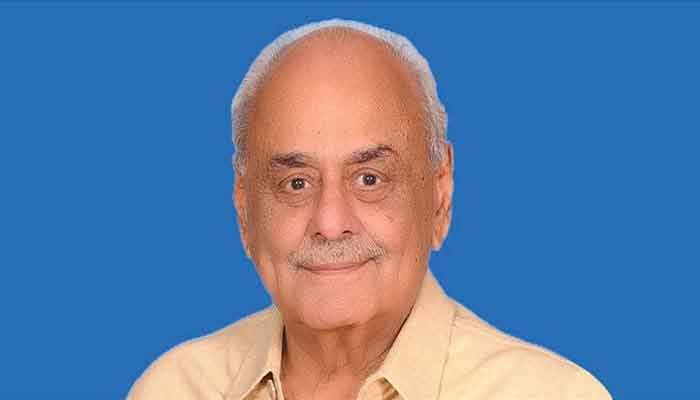Who is Ijaz Shah?
The prime minister took several weeks in taking Ijaz Shah in his cabinet but did not make him NSA. He has been given the portfolio of the parliamentary affairs although he has been elected to any legislature for the first time.
ISLAMABAD: Another former loyalist of ex-President Gen (retd) Pervez Musharraf and ex-spymaster, Brig (retd) Ijaz Shah has made it to the federal cabinet.
With his addition, the number of Musharraf’s close associates in Prime Minister Imran Khan’s team has swelled to at least sixteen. They are federal ministers, ministers of state, advisers, special assistants and the attorney general of Pakistan. The tally would further shoot up if the members of some key members of provincial cabinets, including Punjab Chief Minister Chaudhry Pervez Elahi and Aleem Khan are counted in this lot.
For quite some time, Ijaz Shah’s name was being cited as the next national security adviser (NSA) after the post fell vacant due to the exit of Lt Gen (R) Nasir Janjua. The prime minister took several weeks in taking Ijaz Shah in his cabinet but did not make him NSA. He has been given the portfolio of the parliamentary affairs although he has been elected to any legislature for the first time.
Ijaz Shah has always showed a keen interest in politics and made attempts to land in the National Assembly. He was never successful in any election he contested because of his powerful rival, Rai Mansab Ali Khan (late) of the Pakistan Muslim League-Nawaz (PML-N). First, he was defeated by him in 2013 and then by his daughter, Dr Shizra Mansab, in 2015.
However, he finally routed her in the last general elections with a margin of 2,405 votes from NA-118 Nankana Sahib. Syed Afzal Hussain of the Tehreek-e-Labbaik Pakistan, which is nowhere for quite some time, had secured 49,345 votes as against Ijaz Shah’s 63,818 ballots and Dr Shizra’s 61,413 votes.
In 2013, Shah, supported by some PML-N leaders, had made a serious attempt to get its sponsorship. But when the matter came up before PML-N President Nawaz Sharif, he had remarked that if Shah was to be awarded the ticket, then Musharraf should also be given the PML-N sponsorship.
Ijaz Shah was also in the election cell established by Musharraf for the 2008 polls, which, however, was rendered ineffective due to the intervention of the then army chief, General Ashfaque Parvez Kiyani, to ensure that there is no hanky-panky in the electoral exercise.
Even during his service in the intelligence agencies, he did a lot of development work in his hometown Nankana Sahib keeping in view his future political future. He had got his brother elected as district Nazim of Nankana Sahib.
When Musharraf had imposed martial law in October 1999, Shah was director of the Inter-Services Intelligence (ISI) Punjab. After some time, he was made home secretary of this province.
Ijaz Shah has a very interesting history as spy working in senior positions in the ISI and Intelligence Bureau (IB). When he was in Punjab during Musharraf’s rule, the PML-Q was created in which he was alleged to have a primary role. He had played a dominant part in the controversial 2002 general elections that the PML-Q had swept.
In a 2015 by-election necessitated by the death of Rai Mansab, the Pakistan Tehreek-e-Insaf (PTI), which had boycotted the exercise, had, however, supported Ijaz Shah, who had contested as an independent candidate. At the time, PTI Punjab President Ejaz Chaudhry had stated that his party was backing Shah as it did not want to cede space to the PML-N.
Ijaz Shah was made the IB head in 2004 by Musharraf at the peak of his rule. He was regarded as a long-term close associate and confidant of the former dictator. He was the IB chief, when Benazir Bhutto was assassinated in a terrorist attack at the Liaquat Bagh, Rawalpindi, on December 27, 2007.
The Pakistan People’s Party (PPP) repeatedly accused him of his involvement in the murder. In a quick reaction to Ijaz Shah’s selection for the federal cabinet, PPP leader Nafeesa Shah said that in her life Benazir Bhutto had nominated Ijaz Shah and said that if she was killed, he should be investigated. “During Musharraf’s rule, he had an important role in political engineering.”
Shah’s name had also appeared in an email of an American friend of Benazir Bhutto, listing him as an accused along with some others, including the then Punjab Chief Minister Pervez Elahi, the then Sindh Chief Minister Arbab Ghulam Rahim and former ISI chief Hamid Gul as suspects, if she was killed. But none of them was named in the First Information Report of Benazir Bhutto’s murder.
Ijaz Shah resigned as the IB chief on March 17, 2008. He became a controversial figure as he was accused of using the agency for political victimisation and undermining the judiciary. In 2004, Musharraf's attempt to appoint him as high commissioner to Australia was rejected in an unusual move by Australia’s Department of Foreign Affairs. Instead, Musharraf appointed him to head the IB on February 25, 2004, transferring his predecessor, Wali Muhammad, to Australia.
After Ijaz Shah’s induction in the cabinet, the number of the members of Imran Khan’s core team has gone up to 44 excluding the parliamentary secretaries-- 25 federal ministers, five ministers of state, four advisers and ten special assistants.
-
 Shocking Details Emerge In Martin Short’s Daughter Katherine's Death Investigation: 'Kept To Herself'
Shocking Details Emerge In Martin Short’s Daughter Katherine's Death Investigation: 'Kept To Herself' -
 Yerin Ha On Stepping Into The Spotlight In Bridgerton Season Four
Yerin Ha On Stepping Into The Spotlight In Bridgerton Season Four -
 Nakiska Ski Area Avalanche Leaves Youth Unresponsive, Second Skier Escapes Unhurt
Nakiska Ski Area Avalanche Leaves Youth Unresponsive, Second Skier Escapes Unhurt -
 Igor Komarov Missing In Bali: Seven Foreign Suspects Arrested In Kidnapping Probe
Igor Komarov Missing In Bali: Seven Foreign Suspects Arrested In Kidnapping Probe -
 'I Swear' Director Kirk Jones Says Bafta Broadcast Mishap Failed Tourette’s Advocate
'I Swear' Director Kirk Jones Says Bafta Broadcast Mishap Failed Tourette’s Advocate -
 Yogurt Shop Murders Solved: 1991 Austin Cold Case Finally Linked To Serial Killer
Yogurt Shop Murders Solved: 1991 Austin Cold Case Finally Linked To Serial Killer -
 Iran Tensions Rise As Trump Says He Is 'not Thrilled' With Nuclear Negotiations
Iran Tensions Rise As Trump Says He Is 'not Thrilled' With Nuclear Negotiations -
 Where Is Calvin Klein's Wife Kelly Klein Now After Divorce And Fashion Fame?
Where Is Calvin Klein's Wife Kelly Klein Now After Divorce And Fashion Fame? -
 Kourtney Kardashian’s Role As Stepmother Questioned
Kourtney Kardashian’s Role As Stepmother Questioned -
 Neil Sedaka Dies At 86 After Hospitalisation In Los Angeles
Neil Sedaka Dies At 86 After Hospitalisation In Los Angeles -
 'Lizzie McGuire' Star Robert Carradine's Reason Of Death Laid Bare
'Lizzie McGuire' Star Robert Carradine's Reason Of Death Laid Bare -
 Lisa Rinna Breaks Silence After Recent Reunion With Andy Cohen: 'I've Pissed Him Off'
Lisa Rinna Breaks Silence After Recent Reunion With Andy Cohen: 'I've Pissed Him Off' -
 Savannah Guthrie Mom Update: Unexpected Visitors Spark Mystery Outside Nancy's Home
Savannah Guthrie Mom Update: Unexpected Visitors Spark Mystery Outside Nancy's Home -
 Elle Fanning Shares Detail About Upcoming Oscars Night Plan With Surprise Date
Elle Fanning Shares Detail About Upcoming Oscars Night Plan With Surprise Date -
 Demi Lovato Spills Go-to Trick To Beat Social Anxiety At Parties
Demi Lovato Spills Go-to Trick To Beat Social Anxiety At Parties -
 Benny Blanco Looks Back At The Time Selena Gomez Lost Her Handrwritten Vows Days Before Wedding
Benny Blanco Looks Back At The Time Selena Gomez Lost Her Handrwritten Vows Days Before Wedding




